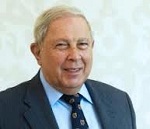 SINGAPORE--India's Cipla argued before the Delhi High Court against the Novartis patent for its Onbrez (indacaterol) COPD drug, saying the patent need not be honored because the Swiss drugmaker was not working it in the country and has licensed it to Lupin instead.
SINGAPORE--India's Cipla argued before the Delhi High Court against the Novartis patent for its Onbrez (indacaterol) COPD drug, saying the patent need not be honored because the Swiss drugmaker was not working it in the country and has licensed it to Lupin instead.
 |
| Y.K. Hamied |
On another stage, in Mumbai, Cipla's president also spoke against what he called the idea that globalization of health means "denial of drugs for the sick and needy." Cipla Chairman Y.K. Hamied, who is also a philanthropist, made the remark to a newspaper at a ceremony at which he was presented the Hall of Fame Chemtech Leadership and Excellence Award for 2015.
Novartis ($NVS) in December took Cipla to court for rolling out a deeply discounted generic of its drug Onbrez without waiting for the courts to rule whether its patents are valid. In New Delhi, Cipla's senior lawyer, P. Chidambaram, pressed Cipla's appeal of the Jan. 9 restraining order against marketing a generic of the Novartis drug to prevent an infringement on the indacaterol patent. Novartis sought the order after Cipla filed to have the drug's patent revoked.
Chidambaram, a former finance and home minister in the previous Congress Party-led government, said not only was Novartis not working the patent, Onbrez was not available in India at numbers anywhere near the demand for it. He said there are about 15 million people with COPD in India, but Novartis had only imported enough to treat 4,500.
He said a patent holder not producing a drug in India and not providing an adequate supply to meet demand was thwarting technological growth in a developing country and its patent should be revoked. The Cipla lawyer also said Onbrez was priced at $10.94 cents for 10 tablets and the generic was priced at only $2.10.
Hamied, meanwhile, credited the Cipla team for the company's achievements and for helping in the fight against a monopoly in health care, particularly in a nation expected to reach 1.65 billion people by 2050. He said most of the populace today has not experienced an improvement in living standards for many years and could not afford any type of monopoly in healthcare.
- read Livemint's take
- and Business Standard's piece